Related Research Articles
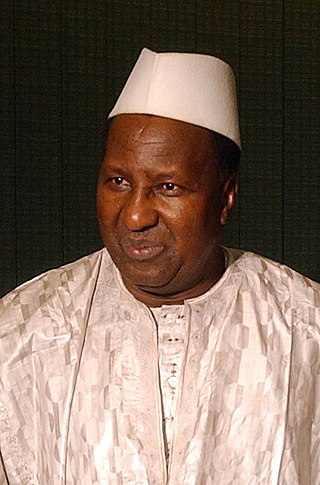
Alpha Oumar Konaré is a Malian politician,professor,historian and archaeologist,who served as President of Mali for two five-year terms from 1992 to 2002 and was Chairperson of the African Union Commission from 2003 to 2008.

Modibo Keïta was a Malian politician who served as the first President of Mali from 1960 to 1968. He espoused a form of African socialism. He was deposed in a coup d'état in 1968 by Moussa Traoré.

Moussa Traoré was a Malian soldier,politician,and dictator who was President of Mali from 1968 to 1991. As a lieutenant,he led the military ousting of President Modibo Keïta in 1968. Thereafter he served as head of state until March 1991,when he was overthrown by popular protests and a military coup.

Ibrahim Boubacar Keïta,often known by his initials IBK,was a Malian politician who served as the president of Mali from September 2013 to August 2020,when he was forced to resign in the 2020 Malian coup d'état. He served as Mali's prime minister from February 1994 to February 2000 and as president of the National Assembly of Mali from September 2002 to September 2007.

The Alliance for Democracy in Mali –African Party for Solidarity and Justice is a political party in Mali.
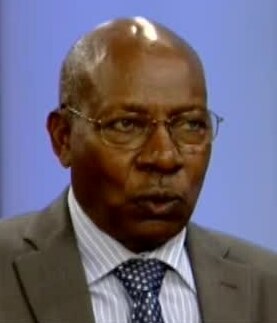
Younoussi Touré was a Malian politician. He was Prime Minister of Mali from 9 June 1992 to 12 April 1993 and was the first prime minister appointed under President Alpha Oumar Konaré. Touréwas the president of the Union for the Republic and Democracy (URD),a political party,from 2003 to 2014. He was First Vice-President of the National Assembly from 2007 to 2012 and President of the National Assembly from 2012 to 2013.
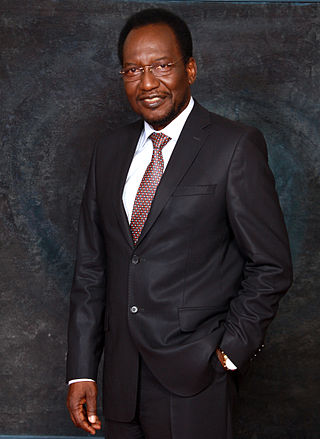
Dioncounda Traoré is a Malian politician who was President of Mali in an interim capacity from April 2012 to September 2013. Previously he was President of the National Assembly of Mali from 2007 to 2012,and he served as Minister of Foreign Affairs from 1994 to 1997. He was President of the Alliance for Democracy in Mali-African Party for Solidarity and Justice (ADEMA-PASJ) beginning in 2000,and he was also President of the Alliance for Democracy and Progress (ADP),an alliance of parties that supported the re-election of President Amadou Toumani Touréin 2007.

Modibo Keita was a Malian politician who was Prime Minister of Mali from 18 March 2002 to 8 June 2002 and from 9 January 2015 to 9 April 2017.
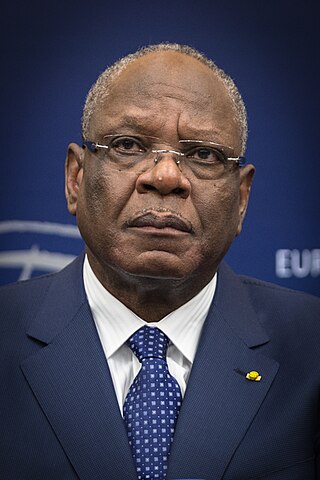
Presidential elections were held in Mali on 28 July 2013,with a second round run-off held on 11 August. Ibrahim Boubacar Keïta defeated Soumaïla Cisséin the run-off to become the new President of Mali.
Tiéna Coulibaly is a Malian politician who has served as Minister of Defense in the government of Mali from 2017 to 2020. Previously he was Minister of Finance from 1988 to 1991,and again from 2012 to 2013. Coulibaly was ousted during the 2020 Malian coup d'état and replaced by Colonel Sadio Camara.

Django Sissoko was a Malian civil servant who was Prime Minister of Mali from December 2012 to September 2013. He was Minister of Justice from 1984 to 1988 and subsequently served twice as Secretary-General of the Presidency,from 1988 to 1991 and from 2008 to 2011. He also served as Ombudsman from 2011 to 2012.

Moussa Mara is a Malian politician who was Prime Minister of Mali from 2014 to 2015. Previously he served in the government as Minister of Town Planning,and he was an unsuccessful candidate in the 2013 presidential election.
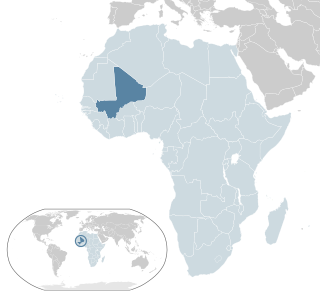
The 26 March 1991 Malian coup d'état resulted in the overthrow of President Moussa Traoréafter over two decades of dictatorship and eventually led to multi-party elections.

Presidential elections were held in Mali on 29 July 2018. In July 2018,the Constitutional Court approved the nomination of 24 candidates for the election. As no candidate received more than 50% of the vote in the first round,a runoff was held on 12 August 2018 between the top two candidates,incumbent President Ibrahim Boubacar Keïta of the Rally for Mali and Soumaïla Cisséof the Union for the Republic and Democracy. Keïta was subsequently re-elected with 67% of the vote. It was the first time in Malian history that a presidential election was forced into a runoff between an incumbent and a challenger.
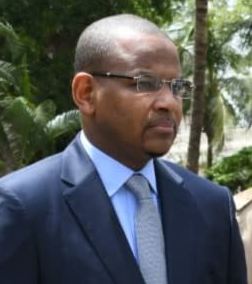
Boubou Cissé is a Malian politician who was the Prime Minister of Mali from April 2019 to his resignation following the 2020 Malian coup d'état in August 2020. He was also the Minister of Economy and Finance and Minister of Mines and Industry.
Mohamed Aly Bathily is a Malian politician. He serves as the Malian Minister of State Properties,Land Affairs and Assets.

On 18 August 2020,elements of the Malian Armed Forces began a mutiny,and subsequently undertook a coup d'état. Soldiers on pick-up trucks stormed the Soundiata military base in the town of Kati,where gunfire was exchanged before weapons were distributed from the armory and senior officers arrested. Tanks and armoured vehicles were seen on the town's streets,as well as military trucks heading for the capital,Bamako. The soldiers detained several government officials including President Ibrahim Boubacar Keïta,who resigned and dissolved the government. This was the country's second coup in less than 10 years,following the 2012 coup d'état. On a subregional level,the coup also marked an end to a period of nearly six years,since the 2014 Burkina Faso uprising and the ousting of Burkina Faso's President Blaise Compaoré,during which there was not a single undemocratic change of government in West Africa. For this subregion,where many countries have a history of civil war and violent conflict,this was a period of remarkable stability,during which ECOWAS even managed to find a peaceful resolution to the 2016–2017 Gambian constitutional crisis.

Bah Ndaw is a Malian retired military officer and politician who served as the president of Mali between 25 September 2020 and 24 May 2021 when he was overthrown during the 2021 Malian coup d'état. Between May 2014 and January 2015 he was Minister of Defense.
The 2021 Malian coup d'état began on the night of 24 May 2021 when the Malian Army led by Vice President Assimi Goïta captured President Bah N'daw,Prime Minister Moctar Ouane and Minister of Defence Souleymane Doucouré. Assimi Goïta,the head of the junta that led the 2020 Malian coup d'état,announced that N'daw and Ouane were stripped of their powers and that new elections would be held in 2022. It is the country's third coup d'état in ten years,following the 2012 and 2020 military takeovers,with the latter having happened only nine months earlier.
References
- 1 2 3 "Oumar Tatam Ly appointed Mali's prime minister". african-bulletin.com. 9 September 2013. Retrieved 27 October 2016.
- 1 2 3 Wilson, Steve (6 September 2013). "Mali makes banker Oumar Tatam Ly its first post-war Prime Minister". telegraph.co.uk. Retrieved 6 November 2016.
- ↑ "New Mali Cabinet includes post for reconciliation and development of north". foxnews.com. 25 March 2015. Retrieved 28 October 2016.
- ↑ "Tuareg separatist group in Mali 'ends ceasefire'". BBC News. 29 November 2013. Retrieved 28 October 2016.
- ↑ "Mali government resigns, new PM appointed - state TV", Reuters, 5 April 2014.